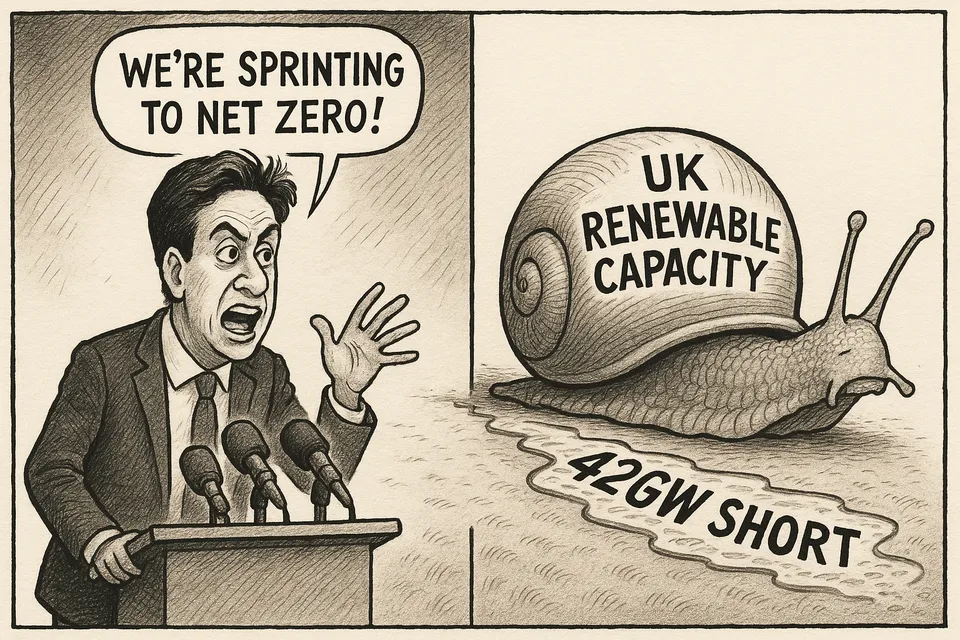Another Net Zero Fantasy Collides With Reality

UK's Clean Electricity Targets in Jeopardy
While Ed Miliband claims to be "sprinting to clean power by 2030," his own government's energy system operator quietly admits Britain will produce almost a third more carbon emissions than needed to meet legally binding climate targets. The gap between ministerial rhetoric and measurable reality has become a chasm.
Commentary Based On
The Guardian
UK’s clean electricity growing too slowly to meet climate targets, report says
The National Energy System Operator’s 10-year forecast reveals the scale of institutional failure. By 2035, the UK will produce 274 million tonnes of carbon dioxide, significantly overshooting the 185-204 MtCO2 range required to stay on track for net zero by 2050. This represents not a minor miscalculation but a systematic failure to deliver on fundamental promises.
More damning still: renewable electricity capacity will reach only 148GW by 2035, falling short of the 170-190GW needed. This isn’t about unforeseen circumstances or technical difficulties. This is about a political class that makes grand promises while lacking either the competence or commitment to deliver them.
The timing matters. This is the second official warning in just one month that climate targets are slipping away. The Committee on Climate Change reported that two-fifths of required emissions reductions either face significant risks or lack sufficient plans entirely. When multiple independent bodies reach the same conclusion, we’re witnessing systemic dysfunction, not isolated oversight.
The Pattern of Perpetual Failure
This latest revelation fits a familiar template in British governance: ambitious targets announced with fanfare, followed by quiet admissions of failure buried in technical reports. The climate targets join a growing list of unmet promises across housing, NHS waiting times, economic growth, and infrastructure delivery.
Consider the institutional choreography at work. Fintan Slye, chief executive of Neso, diplomatically states that progress “isn’t enough” and calls for going “further and faster.” Translation: current efforts are failing comprehensively. Meanwhile, government spokespeople recite achievements that exist primarily in press releases: “sprinting to clean power,” “most significant investment in history,” “strong foundations.”
The disconnect reveals how modern British governance operates. Ministers make declarations detached from operational reality. Civil servants produce reports documenting the gap. Everyone pretends the system works while measurable outcomes deteriorate. The public, meanwhile, will face the consequences through higher energy costs, continued dependence on imports, and the economic impacts of missing international commitments.
Why This Keeps Happening
The renewable energy shortfall exemplifies broader institutional decay. Britain’s political system excels at setting targets but consistently fails at execution. The reasons are structural, not personal.
First, there’s the mismatch between electoral cycles and infrastructure timelines. Politicians need quick wins; energy transformation requires decades of consistent effort. The result: announcement politics trumps actual delivery.
Second, the machinery of government has atrophied. The same Whitehall that once coordinated national infrastructure projects now struggles with basic implementation. Expertise has been outsourced, institutional memory lost, and accountability diffused across countless agencies and consultancies.
Third, there’s deliberate obfuscation. Note how the government spokesperson pivots immediately to attacking opposition parties rather than addressing the substantive failure. This isn’t oversight; it’s strategy. Keep the debate partisan, and avoid scrutiny of actual performance.
The Real Cost of Fantasy Politics
The 126GW gap in renewable capacity isn’t just a number. It represents continued reliance on imported energy, exposure to volatile global markets, and the certainty of either massive future costs or abandoned commitments. British households and businesses will pay the price through higher bills and reduced competitiveness.
More fundamentally, this failure corrodes democratic legitimacy. When governments repeatedly promise transformation and deliver stagnation, public trust erodes. The climate targets were enshrined in law precisely to transcend political cycles. Their likely failure demonstrates that even legal obligations can’t overcome institutional incapacity.
The International Energy Agency and global investors are watching. They see a country that talks ambitiously but delivers marginally. Capital flows accordingly, seeking jurisdictions where plans match reality. Britain’s reputation as a reliable partner diminishes with each missed target.
What Competent Governance Would Look Like
A functioning system would have spotted this trajectory years ago and corrected course. It would have matched targets with concrete delivery mechanisms, allocated sufficient resources, and maintained consistent policy regardless of political changes. Instead, we have a 42GW minimum shortfall emerging over a decade of supposed focus on net zero.
The excuse machinery is already warming up. We’ll hear about global supply chains, planning delays, and inherited problems. All partly true, all fundamentally irrelevant. Other countries manage to build renewable capacity at scale. Britain’s unique contribution is to combine world-leading targets with third-rate delivery.
The Institutional Reality
This renewable energy failure encapsulates modern British decline: the gulf between aspiration and achievement, the substitution of rhetoric for results, and the absence of accountability when promises predictably fail. Neso’s forecast isn’t a warning about the future; it’s a documentation of present failure projected forward.
The political class will continue their performance. Conservatives will attack net zero targets they previously championed. Labour will blame Conservative predecessors while changing nothing fundamental. The machinery of government will produce more reports documenting failure. Emissions will remain stubbornly high.
Meanwhile, Britain slides further behind countries that match ambition with execution. The climate targets will join the long list of abandoned commitments, each failure reinforcing the next, institutional decay compounding over time. This is how modern Britain operates: forever promising transformation, consistently delivering decline, and wondering why nothing ever improves.
The clean electricity target isn’t failing because it’s impossible. It’s failing because British institutions no longer possess the capability to deliver complex, long-term projects. Until that changes, expect more reports documenting the gap between ministerial fantasy and measurable reality. The decline continues, meticulously documented, perpetually denied.
Commentary based on UK’s clean electricity growing too slowly to meet climate targets, report says by Jillian Ambrose on The Guardian.